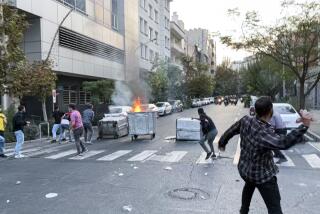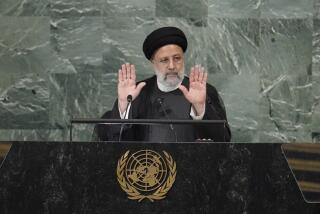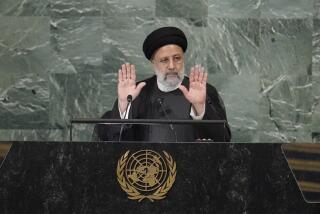Iran, U.S. argue over who spoiled nuclear talks
![Iranian Foreign Minister Mohammad Javad Zarif, seen Sunday with European Union Foreign Policy Chief Catherine Ashton, said, "No amount of spinning can change what happened within the [six powers] in Geneva from 6 p.m. Thursday to 5:45 Saturday."](https://ca-times.brightspotcdn.com/dims4/default/79a1ce4/2147483647/strip/true/crop/600x370+0+0/resize/1200x740!/quality/75/?url=https%3A%2F%2Fcalifornia-times-brightspot.s3.amazonaws.com%2Fc0%2Fb7%2F808cef272d764153d24a27dfb617%2F600)
- Share via
WASHINGTON — The United States and Iran traded heated accusations Monday over who was to blame for the failure of the latest international talks to limit Tehran’s nuclear program, even as they insisted a deal remains possible.
Secretary of State John F. Kerry said it was the Iranians, and not the French, whose last-minute objections Saturday stalled a preliminary deal that diplomats hoped would lead to a final settlement of the nuclear dispute after a decade of stalemate.
“The French signed off on it, we signed off on it,” Kerry said Monday in Abu Dhabi, United Arab Emirates, where he sought to reassure Arab allies about the nuclear negotiations. “Iran couldn’t take it.”
Iran’s foreign minister, Mohammad Javad Zarif, soon fired back. He said most of the delay during the three-day session in Geneva grew from disagreements between the six world powers — the United States, Britain, France, Russia, China and Germany — that are negotiating with Iran.
Zarif appeared to suggest, without naming names, that France’s objections had been particularly assertive.
“Most of the talks were focused on alleviating the dispute among the [six] powers,” Zarif said told state-run Channel 2 television in Iran. “Perhaps one country tried to express its opinion over the negotiations.”
Turning to Twitter, he posted, “No amount of spinning can change what happened within the [six powers] in Geneva from 6 p.m. Thursday to 5:45 Saturday.
“But it can erode confidence,” he added.
Kerry will testify Wednesday in Congress in an effort to stop lawmakers from imposing new sanctions on Iran, fearing such a move could disrupt diplomacy, if not drive Tehran from the bargaining table.
Both Kerry and Zarif insisted that progress was made in Geneva and that a preliminary deal was within reach within months, with a final deal after that.
Zarif said he was sure diplomats could negotiate “outlines and framework to resolve the disputes” within a year. But he added, “The main point is that the West side should build up the trust of the Iranian nation.”
After days of rising hopes, the accusations are politically sensitive for both sides.
The Obama administration, which has come under fire from Israeli leaders and hawks in Congress who fear it may negotiate a weak deal, is trying to dispel suggestions that the French took a tougher stance than the United States.
Iran wants to strengthen its argument that it is eager to solve the standoff through diplomacy but faces unreasonable Western demands.
The latest round of negotiations, which began Thursday, brought the seven countries closer than ever before to a preliminary deal that would curtail some of Iran’s nuclear activity in exchange for the easing of some sanctions.
Although Kerry insisted that the six powers ended the talks united, the final discussions exposed differences in a new way, diplomats said. That suggests the differences could sharpen as the negotiations intensify.
The talks also showed that Iran’s negotiating team had to confer with leaders in Tehran on major decisions, suggesting they had less maneuvering room than some in the West had hoped. Analysts said the Iranian team must step carefully to avoid displeasing the elite in Tehran, or roiling a public that favors continuation of the nuclear program.
In a related development, the United Nations’ nuclear watchdog agency said it had reached an agreement with Iran to settle long-standing disputes and that Tehran would provide more access to two nuclear facilities that have not been under regular scrutiny.
The accord, after years of disputes between the two sides, seemed to signal Iran’s desire to show its eagerness for a nuclear deal.
Yukiya Amano, director general of the International Atomic Energy Agency, told reporters in Tehran that the deal was an “important step forward to start with. But much more needs to be done.”
The deal will allow “managed access” to the controversial Arak heavy-water nuclear plant, which is under construction, and to a mine in Bandar Abbas.
But it will not allow greater scrutiny of a site the agency has most wanted to see, the Parchin military facility, where inspectors suspect Iran may have once experimented with nuclear bomb triggers.
Mark Fitzpatrick, a nonproliferation specialist at the International Institute for Strategic Studies in London, said the deal was “a good step forward. But it doesn’t provide the full transparency the IAEA needs.”
eds.”
More to Read
Sign up for Essential California
The most important California stories and recommendations in your inbox every morning.
You may occasionally receive promotional content from the Los Angeles Times.











